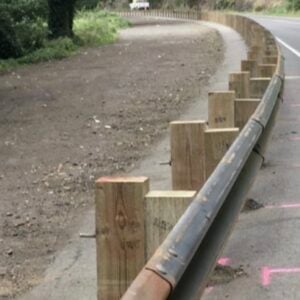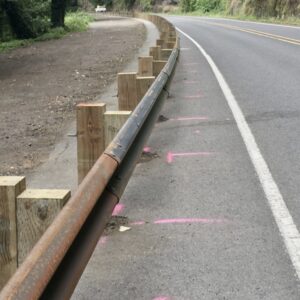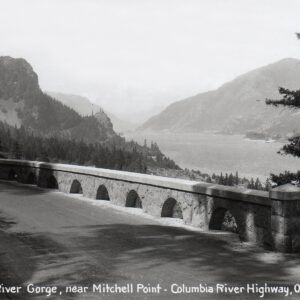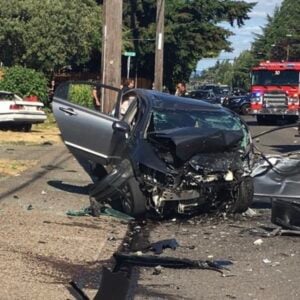“That was the wrong decision and we are in the process of removing two stretches of that guardrail now.”
— Rian Windsheimer, ODOT Region 1 director
We’re happy to report that the Oregon Department of Transportation (ODOT) is removing guardrails they installed late last month on the Historic Columbia River Highway near Troutdale.
On June 24th, ODOT installed three sections of guardrails on the west side of the highway along the Sandy River. They were noticed by a BikePortland Forum user who expressed concerns that the placement of the guardrails on the paved shoulder reduced valuable cycling space and created a safety hazard on a relatively narrow, high-speed road. This highway is part of the Historic Columbia River Highway State Trail and it’s a crucial cycling route for thousands of people each year.
In an email today ODOT Region 1 Director Rian Windsheimer reiterated comments made by his spokesperson last week, that the rails were necessary to address illegal parking and camping in the unpaved turnouts adjacent to the road. But Windsheimer also admitted that a mistake was made by placing them too far into the paved shoulder.
Here’s more from Windsheimer via an email he sent to BikePortland this afternoon (emphasis mine):
“ODOT installed guardrail along the Historic Columbia River Highway and the Sandy River to address safety and health hazards, including addressing illegal camping activity that often blocked the shoulder and was damaging the environment along the river. We intended to install the guardrail and preserve the shoulder area for cyclists. Unfortunately, during the course of construction we located a buried gas line and the decision was made in the field to construct the guardrail closer to the roadway to avoid hitting the gas line. That was the wrong decision and we are in the process of removing two stretches of that guardrail now.“
Advertisement
“The guardrail as previously installed made the roadway less safe for cyclists using this stretch of the Historic Highway, which was not our intent.”
— Rian Windsheimer, ODOT
One part of Windsheimer’s remarks do not line up with what Region 1 Public Information Officer Don Hamilton told us last week. “We certainly understand how this effort reduces space available for bikers and other users,” Hamilton said. He also claimed that because the guardrails prevent illegal camping they actually make the road safer for bike riders.
Today Director Windsheimer clarified ODOT’s stance on the issue by saying, “The guardrail as previously installed made the roadway less safe for cyclists using this stretch of the Historic Highway, which was not our intent.”
Adding to outcry over these railings was that fact ODOT did not consult anyone prior to putting them in. ODOT said that’s because it was considered just a maintenance project so the decision was made by crews in the field.
Jeanette Kloos, head of Friends of the Historic Columbia River Highway told us via email today they were not notified about the project and would have preferred a different solution. And Chair of ODOT’s Historic Columbia River Highway Advisory Committee Arthur Babitz also said he wasn’t aware of the railings. Babitz was concerned they jeopardized bike safety and might have even been out of compliance with state historic preservation rules. “I will be encouraging ODOT to use the HCRH Advisory Committee to vet issues like this in the future,” he shared via email.
Whatever solution for the illegal parking and camping they come up with, we’re glad to know it will be one that doesn’t sacrifice the safety of highway users.
— Jonathan Maus: (503) 706-8804, @jonathan_maus on Twitter and jonathan@bikeportland.org
— Get our headlines delivered to your inbox.
— Support this independent community media outlet with a one-time contribution or monthly subscription.








Thanks for reading.
BikePortland has served this community with independent community journalism since 2005. We rely on subscriptions from readers like you to survive. Your financial support is vital in keeping this valuable resource alive and well.
Please subscribe today to strengthen and expand our work.
So given that the hole patch/repair job is going to be horrible, this really seems like the time for ODOT to do the right thing, start over, and add a nice, protected bike lane along this stretch.
1. Agency screws up
2. Agency gets called on it
3. PR guy spins things to deny it’s wrong, which usually works
4. People point out why the spin is BS
5. Agency has no choice but to tear it out because it was wrong the whole time
I really appreciate the reporting and resistance that prevented this from being a done deal after Step 3.
wow! this is the first good news I’ve read in a while.
This should come out of ODOT Region 1 Director Rian Windsheimer pay…might make the system a little more accountable…
That’s good news. I hope the pavement patching is done carefully and that it holds up.
PBOT cannot remove speed bumps with ANY grace, so don’t hold your breath.
I’m glad to hear it’s PBOT’s fault – for a minute there I thought it was ODOT…
I know it was a team effort…but great work Jonathan!!
OK this wasn’t a construction project, it was maintenance!? Funny how one part of ODOT can hold itself unaccountable. What a perfect alibi for doing wrong. “It wasn’t us, it was maintenance” as the agency simultaneously denies responsibility and blames itself.
Well glad they are fixing it.
I’ve got a great idea, how about ODOT hires a consultant. I only charge whatever this project cost Oregon to install and uninstall.
It seems ODOT can’t keep their lies straight anymore.
Yes, this is a great example of the great hidden latitude that operations crews ‘rightly’ have with maintenance projects to make the world great for vulnerable roadway users [or not]. This is where ‘multimodal’ / context sensitivity training is so necessary. Though in this case I would say that they did step outside the “maintenance” box as this project needed ‘some oversight’ vs ‘gettitdone’ even if it were not in the historic zone…so two strong reasons to have done it.
There is always the pressure of managers to keep crews working especially when schedules get so messed up or traffic volumes drop and work efficiencies outpace plans or process. (Though I do not look forward to riding along the future patched sections with a loaded touring bike…I hope the inspectors are on top of it.)
I do give ODoT leadership credit for saying “my bad”. This is a big step in the right direction.
Having actually worked as a manager in a transportation agency, I can assure you that there is no shortage of work to be performed. There’s all kinds of stuff to do that is not affected or caused by traffic volumes: vegetation to be trimmed, culverts to be cleaned, faded or vandalized signs to be replaced, traffic signals needing to be tested and refurbished, etc. You don’t recognize how much maintenance needs to be done until you’re on the inside.
As I’ve written previously, the guardrail installation was clearly wrong and I’m glad it’s being removed, but it was certainly not installed because managers were trying to keep their crews busy.
So what is the alternative to keep the bums out along the Sandy river?
We could follow Finland’s model.
Instructions unclear, I threw the homeless off fjords.
not many fjords in Finland.
But lots of Saabs and Volkswagens.
Guess I was thinking of Norway.
I doubt that there is a single solution. However, boulders were specified in the previous article on this issue.
Please don’t use the word “bums”. It’s an unnecessary insult and it’s just not cool. Thanks.
As for an alternative. I’d vote for supporting people with social services and housing so they don’t need to live on the side of a highway. In the meantime, if they want to prevent parking they can still install a guardrail, just do it further over into the shoulder so it doesn’t narrow the width of the highway. Pretty simple really.
And FWIW boulders would be a bad solution. We shouldn’t be limiting access to the river as long as their is public right-of-way here.
I vote for jersey-style barriers. Here are some, which may not be heavy enough, that can be filled with sand or water:
https://www.crowdcontrolwarehouse.com/products/water-sand-fillable-traffic-barrier-32-h-x-72-l-x-18-w
ODOT could put them at the very edge of the shoulder, preserving its use for cyclists, pedestrians, and other non-motorized users.
Oh my God he said the “B” word! He’s a BIGOT! Probably one those privileged persons who burns all those fossil fuels and does nothing but be micro-aggressive to people all day.
I had the nerve of cooking dinner for some strangers in a hostel over the weekend, too.
This comment is a micro aggression.
Your term for the folks camping along the road here is out of date, it should only be used in one particular circumstance. In the case of elected officials that ignore the will of their constituents. It should only be used in the following way,” Lets all show up on election day and vote the bums out.”
You are familiar with the “euphemism treadmill”, I assume?
Are you referring to Ted Wheeler?
Kudos to your understanding of how the rules work in this echo chamber. One guy, who comments all the time, but has similar views as dad is allowed to use the prohibited word. Another guy, who doesn’t have the same views as dad, is told to not use the word.
Glad these are being removed, I really am since this guardrail will not fix homelessness, those turnouts are useful, and vulnerable road users should not be endangered. If the guardrails were not removed a chainsaw could be a tempting alternative.
Are they though? I live on e historic columbia river highway and there were more trucks with fresh supplies to install more guard rails going further up the road yesterday….
I hope they repave the entire shoulder now, or it’ll be a bumpy ride!
The all-powerful bike lobby strikes again!
Where’s your God now, Lori?
Thank you for calling attention to this! Glad it’s going to be removed.
Thank you, Jonathan!!!! I want to mention I found it especially upsetting that the art studio owner lady said it’s dangerous for bikes and we have to ride at our own risk, but that the guard rails are necessary to prevent cars from driving off cliffs. Bit of a double standard. She also said there are other safe places to ride. That maybe true, but this highway is the only way to get to the gorge, excepting the I84 freeway.
I am glad to hear that those guardrails have been removed. We need to make sure no guardrails are put in there again. Those areas need to be conserved for people to park their cars so that they can enjoy free access to the Sandy River. I, along with many friends, have been regularly going to the spot on the Sandy River near the now-burned-down Tippy Canoe, just downstream from it, where the guardrails were put in. It’s free, it’s beautiful, it’s shallow water in the summer and it’s a great spot for hanging out on a nice day. The fact that ODOT did this is not cool at all, for bicyclists, for river users, and for the public in general. Please keep us up to date on this, if they try to install guardrails there again, we must fight this. People need free access to the Sandy River, not just in Lewis & Clark and Glenn Otto parks, but at that prime spot just north of the Tippy Canoe where the guardrails had been installed. With guardrails there, it will just cause people to park on the side of the road elsewhere in spots by the Stark Street Bridge where there are No Parking signs, and will clog up the road all over between I-84 and Springdale, both parking illegally and also trying to find a spot. That will make it more dangerous for bicyclists, too. I’ve been a bicyclist in Portland my entire life (minus my first four years, when I was a tricyclist), I’m 47 now, and though I’ve never biked that stretch of highway, it needs to stay safe for all bicyclists and that free river access needs to remain. We need to put money into helping the houseless and into cleaning up litter and trash, not just arbitrarily erecting barriers that literally put bicyclists at physical risk and that keep people from accessing a beautiful spot on the river that people have been going to for decades.
The crappy post hole patches are still there as of 7/30/2023. Somehow I thought they’d repaved the shoulder, but sadly the memory still remains of this ODOT screwup.